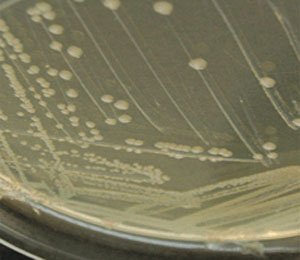Antibiotic Resistance Mechanism in Bacteria Revealed

The research, published in "Science" and entitled "The SOS response controls integron recombination", was carried out by the Molecular Microbiology Group belonging to the UAB Department of Genetics and Microbiology and coordinated by professor Jordi Barbé, and the teams directed by Dr Ivan Erill (researcher at the CSIC National Microelectronics Centre and lecturer of Bioinformatics at University of Maryland) and by Dr Didier Mazel (Université de Limoges and Institut Pasteur).
Treatments using certain antibiotics or chemotherapeutics disturb the copying of the bacteria's genetic material and block DNA replication. This activates bacteria cells into what is called an SOS response, in which a set of genes function as a repair system of lesions in the DNA and guarantee the DNA's stability.
Researchers of the Molecular Microbiology Group at the UAB Department of Genetics and Microbiology have spent years studying the activation mechanisms of SOS response and now reveal that this response at the same time controls and increases the incorporation and mobility capacity of genes found within genetic elements known as integrons. One of the components of these genetic elements are genes which determine the resistance to a wide range of antibiotic and chemotherapeutic substances. Similar to the pieces of a jigsaw puzzle, integrons restructure themselves inside the DNA of bacteria by randomly adding, separating or rearranging their genes, thereby modifying the manner of expression and adapting to the needs of every moment, which are mainly defined by the stress conditions of the bacteria. Integrons can also transfer themselves from one bacteria cell to another and thus spread their antibiotic resistance genes.
Through bioinformatic analyses of bacterial genome databases researchers determined that the capacity to incorporate and recombine integron genes present in several bacterial species (such as Vibrio cholerae, Vibrio parahaemolyticus and Escherichia coli) form part of the bacteria's SOS response. This would imply that the response regulates the bacteria's manner of expression. These findings are of utmost importance since they prove that the activation of a response to the use of an antibiotic or a chemotherapeutic acting upon the bacteria's genetic material favours not only the expression of all resistance genes present in the integron, but also of its organisation to counteract the presence of these antibacterial agents. At the same time, specific antibiotic or chemotherapeutic treatments stimulate the capturing of new resistance mechanisms and promote the dissemination of these mechanisms to other pathogenic bacteria.
According to researchers, the results of the study, together with previous findings from the Molecular Microbiology Group at the UAB Department of Genetics and Microbiology carried out with the pathogenic bacteria Staphylococcus aureus, pose the need to reflect upon the generalised use of antibacterial substances which interfere with the bacteria's DNA replication, and to bear in mind the negative impact these types of compositions can have on the treatment of infectious diseases caused by bacteria, given that there is a general increase in the acquisition and dissemination of antibiotic resistance mechanisms in pathogenic bacteria.
References
"The SOS response controls integron recombination". Science. Vol. 324, Pag. 1034 (2009).

